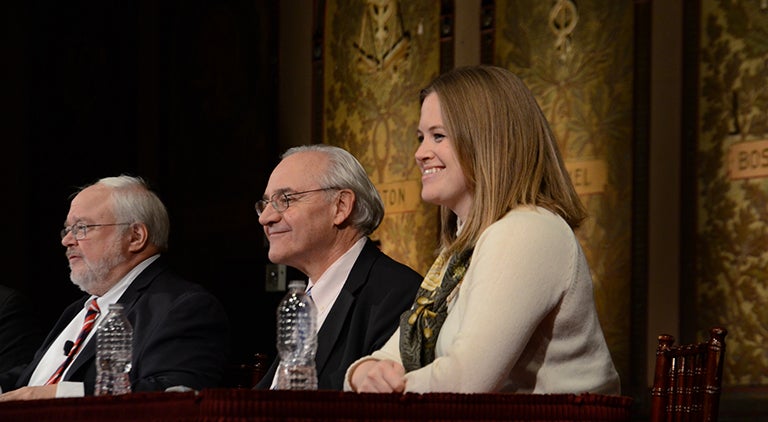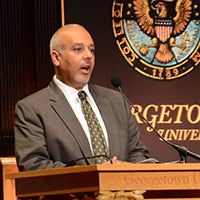Title: Political Commentators Weigh In on Faith and the 2016 Election
Top political commentators gather at the behest of Georgetown’s Initiative on Catholic Social Thought and Public Life and GU Politics for an event on faith and the 2016 election.

Nov. 11, 2016 – The 2016 election shows that America may be as divided as it was in the 1850s, Washington Post columnist and McCourt School professor E.J. Dionne said at Georgetown last night.
“We know where that ended up that up in 1861,” he said. “We are riveted along the lines of gender, divided by class, deeply divided by race, divided by immigration status and national origin. The polls paint this picture very, very clearly.”
Dionne joined three other top political commentators yesterday for “Election 2016: What Happened, Why, and What Does It Mean?” sponsored by the university’s Initiative on Catholic Social Thought and Public Life and its McCourt School of Public Policy’s Institute of Politics and Public Service (GU Politics).

New Political Landscape2
Mo Elleithee, founding executive director of GU Politics, opened the discussion, with initiative founder and director John Carr moderating a panel with Dionne; Washington Post national political reporter Bob Costa; Washington Post syndicated columnist and former George W. Bush aide Michael Gerson; and Time magazine religion correspondent Elizabeth Dias.
“Everything I thought I knew about politics, everything I thought I knew about elections, having worked on elections on every level of government, having won quite a few, having lost quite a few, was thrown out the window,” Elleithee said in his opening remarks.
Trump and Francis
Carr, also America magazine’s Washington correspondent, said he wasn’t sure which was more improbable – Donald Trump becoming President of the United States or “an old Jesuit from Argentina picking the name Francis and speaking before the U.S. Congress.”
He explained the event was not just another political panel.
“We try to look at this through the lens of Catholic social thought, and in some ways through the message of Pope Francis,” he said. “And the most important thing we can do before we begin this is to remind us of what that tradition is about – it is about the human person. It is about life and dignity. It is about the poor and the vulnerable… “
Disconnected Elite
Gerson, a former top aide to President George W. Bush, is now senior advisor at One, a bipartisan organization dedicated to fighting extreme poverty and preventable diseases. He said Trump getting elected represents a backlash against multiculturalism, among other factors.
“The fact of the matter is that there was an elite world that was entirely disconnected from what was going on in the country, a world of polling and punditry and politics that was really not in touch with the America that doesn’t read The New Yorker,” he said.
Gerson said many white Americans feel disoriented by a changing society in which they are becoming a minority, noting that after World War II eight out of 10 Americans were white Christians, but last year they represented less than 50 percent of the population.
“We are also seeing the decentralization of the media, where there are no gatekeepers but also no fact-checkers,” he added. “We have conflicts of class that are deeply destructive to the fabric of the country.”
Political Commodities
Both Gerson and Dias noted that Clinton didn’t reach out to religious voters the way Obama did.
But Dias, author of the 2015 book, What did Jesus Ask? Christian Leaders Reflect on His Questions Faith, said she wasn’t sure that would have mattered because of the deep divisions among all Americans.
“Part of the problem,” she said, “… is that people and groups of people have become … political tools and commodities for political expediency… so even if the Democrats had targeted religious voters, it wouldn’t have gotten us out of this mess, when no one really listens to each other.”
The Disrupter
Costa, who covered the Trump campaign for the Post, said that unlike Trump, former presidential candidates Ted Cruz and Ben Carson would tell evangelical voters everything they wanted to hear, but that Trump was the one they saw as disrupting the status quo.
Even when Trump clashed with the pope and many Catholics cringed, Costasaid many of them voted for the Republican nominee anyway, and that many religious voters, particularly evangelicals, feel like outsiders because of their faith and see government as a threat.
“So many of them voted for Donald Trump not because of what he believes, but what he represents, which is disruption,” the reporter explained.
Everyone Counts
The deep divisions in today’s society were lamented throughout the event.
Gerson said he tries to remind his evangelical colleagues that Christianity means that “everyone matters, that everyone counts, that no insignificant person was ever born.”
“This message of human dignity stands in judgment of both parties at various points,” he added. “And it stands in judgment of both ideologies – both conservative and liberal. When anyone finds themselves on either side of the debate uniformly holding the view of their political cohorts … you should be concerned about your own set of beliefs.”